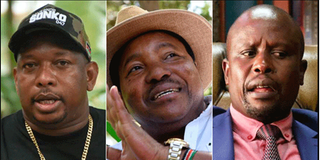Premium
Why politicians want their nicknames on the ballot

From left: Former Nairobi governor Mike Sonko, Former Kiambu governor Ferdinand Waititu and Kieni MP Kanini Kega.
What you need to know:
- Senator Ephraim Maina wants restrictions on the use of nicknames lifted.
- If adopted by the National Assembly, Raila Odinga will end up being the biggest beneficiary.
Politicians with popular nicknames that outwit their official names could have them on the ballot in the August General Election.
However, unlike in the past where inclusion of nicknames on the ballot has been done only after the politician has gone through the rigours of changing their true identity, this will not be case, at least if the National Assembly concurs with senators in the proposals contained in the Elections (Amendment) Bill, 2021 which was sponsored by Nyeri senator Ephraim Maina.
Through the Bill, Mr Maina wants restrictions on the use of nicknames on the ballot lifted so that willing candidates can present themselves in party primaries or the elections through an identity they are known for.
In coming up with the proposals, the senator argues that the restrictions on the use of nicknames violates a candidate’s right to contest in an election as well as voters’ rights to freely express their will.
“The ultimate goal of an election is to ensure that voters choose their preferred leaders in a free and fair environment. Name recognition is an important aspect of free and fair election and should be enabled to the fullest extent,” Mr Maina said.
Should the National Assembly agree, Orange Democratic Movement leader Raila Odinga will be the biggest beneficiary of the proposals because of a plethora of nicknames that he has acquired in his long, controversy-laden, political career.
Having defined national politics for several decades, Mr Odinga has acquired many political nicknames along the way.
From Tinga in the late 1990s, to Agwambo when he led the onslaught against Kanu in the 2002 General Election, to Baba since 2015, when he defined himself as single challenger of the Jubilee regime, Mr Odinga will have a myriad of nicknames to include on the ballot should the Bill receive the all-important presidential assent.
Political names
In a recent TV interview, Kieni MP Kanini Kega revealed that he was forced to abandon his true identity after it twice cost him the parliamentary seat, before his ultimate triumph in 2013.
Mr Kega’s true identity is James Mathenge Ndung’u.
“I lost twice because my supporters only knew me by my nickname. They ended up voting for other people,” he said.
“Most people who knew me before I joined politics are the only ones who know me as Mathenge. Kanini Kega has been my name in the political arena,” he added.
While most politicians have acquired political names along the lines of their character, adopting their use at the ballot is hampered by the stringent legal requirements that restricts the ballot to identity of a candidate as captured either in the passport or the national identity card.
A candidate who wishes to have their nicknames included into the ballot have to go through a lengthy and tedious legal process enumerated in the Registration of Persons Act, the Registration of Documents Act and the regulations arising from the two laws.
The law requires one to sign an affidavit with the commissioner of oaths after which a document known as a Deed Poll is registered with the Registrar of Documents.
With a Deed Poll, one can change their forenames, surnames, add names, remove names or rearrange their existing names. One takes up the new identity only after a notice of the Deed Poll is published in the Kenya Gazette.
Changed identity
Among those who have taken the painful path of changing their identity are Kiambu senator Kimani Wamatangi, whose real identity is Paul Kimani and Murang’a Governor Francis Mwangi, who is known as wa Iria.
Previously known as Mbuvi Gideon Kioko, the former Nairobi governor added the name Mike Sonko before he was elected Makadara MP in a 2010 by election. Known in Nyeri County as Mr Kirinyaga, Mr Maina believes the inclusion of the name on the ballot will work in his favour in the elections.
“I have never known why they decided to tie the ballot on the national identity card,” he said, describing the process as a great inconvenience as a change of one identity affects one academic certificates, which are not easy to change.
The lawmaker has amended Section 32 of the Election Act and introduced a new clause that will require a candidate’s nickname be included on a ballot paper alongside the official name for purposes of party primaries or a general election.
The senator has defined a popular name as one in which a candidate is known to the public, but which does not appear in the national identity card or passport, the key items required in voting.
If enacted into law, candidates will be required to apply to the commission for the inclusion of their popular names on the ballot for a General Election or party primaries.
Party primaries
In the case of political party primary, the candidate will have to make the application at least 21 days before the party submits to the IEBC the names of the persons contesting in its party primaries.
In case of independent candidate, the commission will, within seven days of receiving the request, notify the candidate on its decision in writing.
Where the commission grants the permission for use of popular name, it will issue a candidate a certificate to prove that it has authorised the use of the name, opening the way for the use of the popular name.





